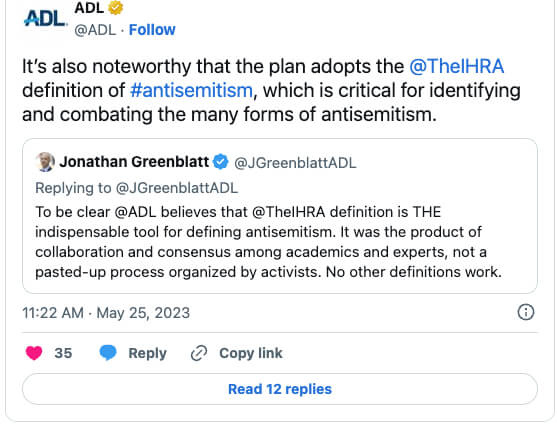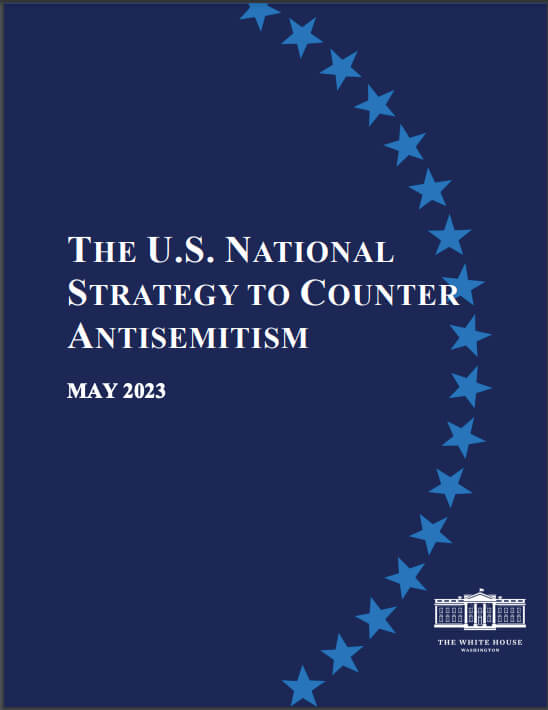Who won the debate over defining ‘antisemitism’ in new White House report?
For weeks, Jewish groups had been lobbying over the definition that national strategy to combat antisemitism would embrace

A man and girl in the Crown Heights neighborhood of Brooklyn stand opposite a police van, Dec. 31, 2019. Brooklyn was the location of more than one-third of the total number of anti-Semitic assaults committed last year, according to the Anti-Defamation League. Photo by Spencer Platt/Getty Images
The White House carefully crafted a definition of antisemitism — or rather declined to craft one.
In the weeks before the Biden administration released the nation’s first comprehensive plan to combat antisemitism on Thursday, Jewish groups jockeyed over the definition to the point that even they worried the debate would overshadow the substance of the report itself.
The definition used in the plan, a response to rising antisemitism in the U.S. and the product of more than six months of conversations with more than 1,000 Jewish leaders, mattered to many American Jews.
In the end, the Biden administration appeared to adopt no definition wholesale, giving credence to several. Many, not all, on one side of the debate — the more stridently pro-Israel side — claimed victory.
Mainstream Jewish organizations had pushed for the adoption of the International Holocaust Remembrance Association’s definition, which includes examples that characterize much strong criticism of Israel as antisemitic. “No other definitions work,” Anti-Defamation CEO Jonathan Greenblatt had tweeted.
Listen to That Jewish News Show, a smart and thoughtful look at the week in Jewish news from the journalists at the Forward, now available on Apple and Spotify:
That didn’t sit well with many progressive Jews and Jewish groups, who feel IHRA stifles legitimate criticism of the Jewish state, and focuses too much of the fight against antisemitism on rooting out anti-Zionism.
Though neither side in the debate got to see a full-throated endorsement of any definition, the Biden administration came much closer to embracing the IRHA definition than any other, and Greenblatt declared victory on Twitter Thursday morning:
“It’s also noteworthy that the plan adopts the @TheIHRA definition of #antisemitism, which is critical for identifying and combating the many forms of antisemitism.”

Senate Majority Leader Chuck Schumer, the highest-ranking Jewish elected official in U.S. history, said in a statement after the report’s release that he “worked especially hard to make sure the Strategy incorporates the International Holocaust Remembrance Alliance (IHRA) working definition of antisemitism.”
But Matt Brooks, the head of the Republican Jewish Coalition, said that, despite initial reports that the strategic plan would embrace IHRA, it didn’t. Instead, he wrote, the administration attempted a “last-minute straddle — undermining the IHRA definition by promoting it alongside an alternative definition that says applying double standards and singling out the Jewish state for criticism is not antisemitic.”
“The decision seriously weakens the White House strategy,” he added.
Other Jewish leaders said they were pleased with the White House decision to recognize more than a single definition of antisemitism in the report.
Jeremy Ben-Ami, who heads J Street, which calls itself “the political home of pro-Israel, pro-peace, pro-democracy Americans” and often stands to the left of the ADL, said: “We’re glad that the White House recognized that codifying any one specific, sweeping definition of antisemitism as the sole standard for use in enforcing domestic law and policy could do more harm than good,” Ben-Ami wrote.
The Progressive Israel Network issued a similar statement, expressing gratitude that “the administration did not focus its strategy solely on the problematic International Holocaust Remembrance Alliance’s (IHRA) working definition of antisemitism, and did not seek to formally codify this definition into US law.”
Careful wording
The White House addresses the definition of antisemitism in two paragraphs in the 60-page report.

The first paragraph describes it in terms few Jewish groups would dispute:
“Antisemitism is a stereotypical and negative perception of Jews, which may be expressed as hatred of Jews. It is prejudice, bias, hostility, discrimination, or violence against Jews for being Jews or Jewish institutions or property for being Jewish or perceived as Jewish. Antisemitism can manifest as a form of racial, religious, national origin, and/or ethnic discrimination, bias, or hatred; or, a combination thereof. However, antisemitism is not simply a form of prejudice or hate. It is also a pernicious conspiracy theory that often features myths about Jewish power and control.”
The second paragraph addresses the formalized definitions of antisemitism that have divided American Jewish groups, and around which debate over the plan has centered.
“There are several definitions of antisemitism, which serve as valuable tools to raise awareness and increase understanding of antisemitism,” the report states in its first section. It gives a nod to the IHRA definition as “the most prominent” and notes that the U.S. has “embraced” it. (The State Department and many state and local governments have, but the Education Department in January chose not to.)
The report then refers to other definitions, saying the administration “welcomes and appreciates the Nexus Document and notes other such efforts.” (The Nexus Document suggests a somewhat higher bar than IHRA for deeming anti-Israel criticism as antisemitic.)
The definition favored by many left-leaning Jews, The Jerusalem Declaration on Antisemitism, gets no specific mention in the White House plan. The report follows its brief treatment of definitions with what could be a signal to get past the debate. “The focus of this national strategy is on actions to counter antisemitism.”
Supporters of the IHRA definition may also feel vindicated by other language in the plan.
“Jewish students and educators are targeted for derision and exclusion on college campuses, often because of their real or perceived views about the State of Israel,” the report states early on, in a section on framing the challenge of antisemitism. It concludes: “When Jews are targeted because of their beliefs or their identity, when Israel is singled out because of anti-Jewish hatred, that is antisemitism. And that is unacceptable.”
Editor’s note: This story has been updated to show that Schumer is the highest-ranking Jewish elected official.























